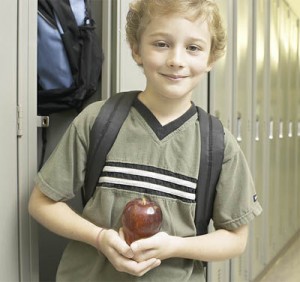Forget the Holidays. For Some Students, Unhealthy Snacks are around All Year Long.
It can be tough to eat healthy during the holidays. Coworkers bring sugar cookies to the office, a neighbor drops off a pie as a gift – and then there are all those treats served during holiday parties.
There’s a lot of talk about all the extra calories Americans consume during the holiday season, and for good reason. But what many people might not realize that many of our nation’s schools serve up unhealthy snacks all year long, and it’s having a big impact on the health of our young people.
Students in the United States consume almost 400 billion calories from junk food sold in schools each year, the nonprofit group Mission: Readiness recently reported.
And while many students can easily find unhealthy items such as potato chips or candy bars on campus, they might not be able to locate healthy snacks even if they tried. Fewer than half of secondary schools in 49 states sold healthy snacks such as fruits and vegetables in venues like vending machines or student stores in 2010, according to a recent study from the Kids’ Safe & Healthful Foods Project (KSHF).
Improving the quality of school snacks is a key part of the overall effort to reduce childhood obesity rates. More than 23 million kids and teens are now overweight or obese, which can cause serious health conditions such as type 2 diabetes, hypertension, high blood pressure and even cancer.
The consumption of 110 to 165 calories above recommended amounts per day may be responsible for the rising rates of childhood obesity, according to the KSHF report. The caloric difference is about the difference between an apple and a bag of potato chips – in other words, a healthy snack versus an unhealthy one.
KSHF researchers say that their findings provide proof that the U.S. Department of Agriculture (USDA) should issue nutritional guidelines for all foods and beverages sold in schools. While the USDA is currently implementing nutritional standards for school meals, strong guidelines for school snacks do not exist (although USDA officials have said they plan to release such guidelines soon).
Some states already have established rules for what types of snacks can be sold on campus, and research shows such restrictions have made a positive impact. Children and teens who attend schools in states with strong school snack policies gained less weight over a three year period than young people living in states without such guidelines, a study published in Pediatrics found.
Several cities have touted similar progress. New York schools stopped offering unhealthy snacks as part of a major effort to improve student health, which also included initiatives such as increasing time for physical activity and educating students and parents. Within four years, the district saw a 5.5 percent decrease in obesity rates among students in kindergarten through eighth grade.
In Philadelphia, the school district implemented strong nutritional guidelines for school snacks and banned unhealthy beverages such as soda and sugary drinks. In September, the city reported a nearly 5 percent drop in obesity rates among students between the 2006-07 and 2009-10 school years.
But many schools lag behind. More than a quarter of secondary schools in 36 states sell less healthy beverages such as candy bars, chips and chocolate chip cookies, the KSHF report found.
All students deserve a healthy school environment, during the holiday season and all year long. Click here to tell the USDA to implement strong nutritional guidelines for all snacks and drinks sold in schools.
Elizabeth Brotherton-Bunch is a senior writer and editor for PreventObesity.net, which is building a movement of Leaders and Supporters dedicated to reversing childhood obesity. Working to reverse childhood obesity in your community? Click here to apply to be a PreventObesity.net Leader.
This post is part of the MomsRising.org Junk Free Schools Blog Carnival and Healthy Holiday Food Blog Carnival.

The views and opinions expressed in this post are those of the author(s) and do not necessarily reflect those of MomsRising.org.
MomsRising.org strongly encourages our readers to post comments in response to blog posts. We value diversity of opinions and perspectives. Our goals for this space are to be educational, thought-provoking, and respectful. So we actively moderate comments and we reserve the right to edit or remove comments that undermine these goals. Thanks!